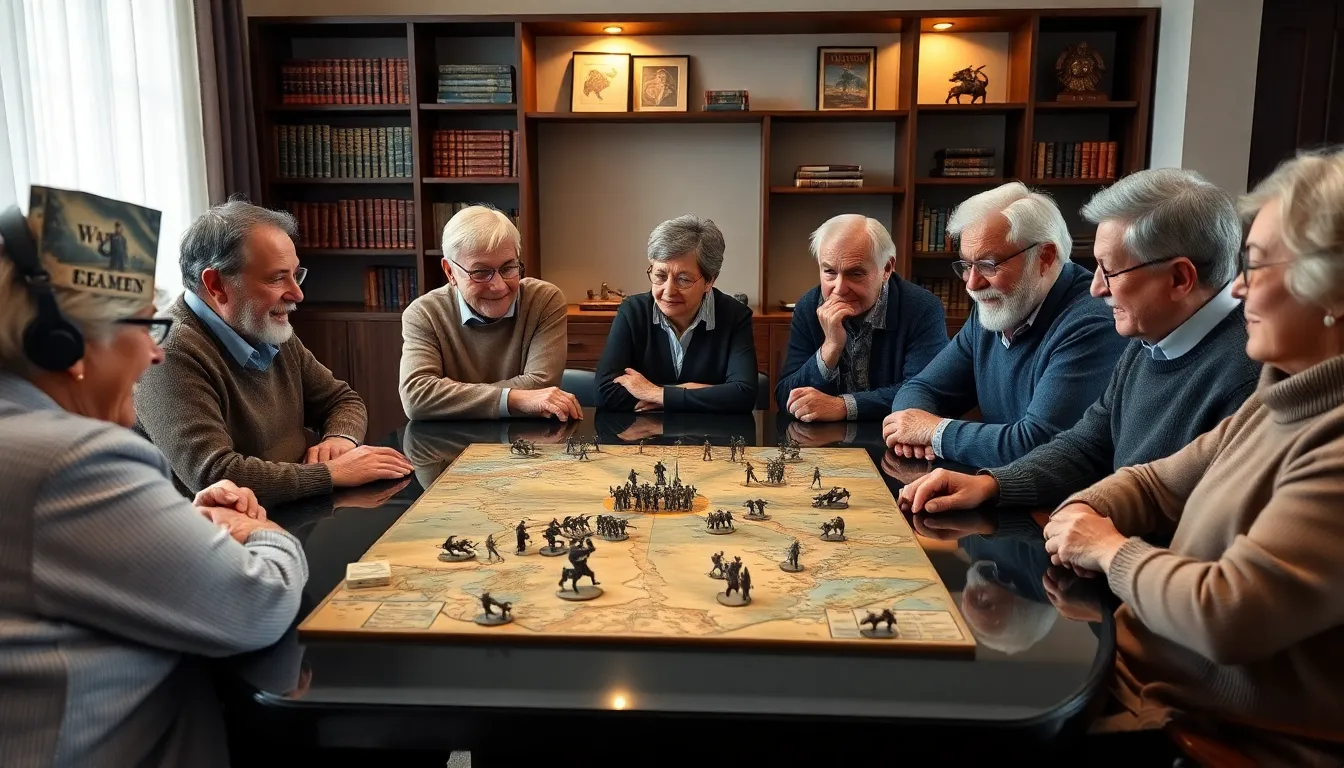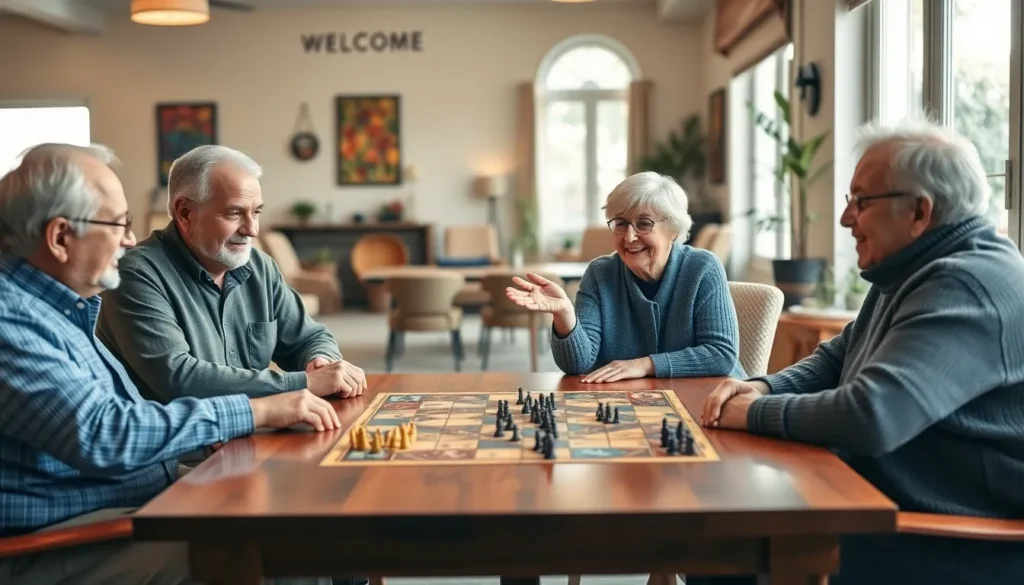Table of Contents
ToggleWar games have long captivated the imagination of people of all ages, but you might find yourself chuckling at the notion of your grandparents rolling dice and moving figurines across a battlefield. Whether it’s a nostalgic nod to their own youthful days or simply an avenue for enjoying some friendly rivalry, these games have much to offer. For seniors, war games aren’t just about strategy and luck: they provide mental stimulation, social interaction, and a delightful distraction from daily routines. So, grab your glasses (not just for reading the rules) and get ready to explore the vibrant world of war gaming for elders.
Understanding the Appeal of War Games for Seniors

War games, in their many forms, have a unique charm that speaks to older adults. Many seniors have lived through historic events or have spent hours watching war movies, so they possess an innate connection to the themes and mechanics typically found in these games.
Also, the cognitive challenges presented by war games help stimulate mental faculties. Engaging in strategic thinking often brings a thrill that runs deeper than mere competition. Also, the element of storytelling involved in many war games allows players to immerse themselves in different eras, enhancing their experience. It’s not just about moving pieces on a board: it’s about channeling a sense of adventure that may have lain dormant for years.
Finally, let’s not forget the nostalgia factor: tapping into memories of their youth, players might find a sense of comfort in revisiting familiar scenarios. It becomes a blend of fun, engagement, and a hearty dose of war history that keeps players coming back for more.
Benefits of Playing War Games in Elderly Communities
The advantages of introducing war games in communities with seniors are plentiful. First and foremost, they promote mental agility. Numerous studies show that strategic games improve cognitive functions, including memory, problem-solving skills, and critical thinking.
Social connections are another key benefit. When seniors gather for war games, they create bonds through shared experiences and laughter. This communal aspect tackles loneliness, which can plague many in elder communities. They start engaging in conversations, fostering friendships, and eventually feeling more content.
Besides, these games promote fine motor skills and hand-eye coordination. Whether it’s manipulating pieces or handling cards, different war games demand dexterity, which can be a fun way to keep the hands agile.
Finally, let’s not overlook the sheer joy of competition. Friendly rivalries can ignite laughter and excitement, providing a refreshing break from routine.
Popular War Games Suitable for Older Adults
Choosing the right war games can make all the difference in ensuring that seniors enjoy the experience. Here are a few popular options:
- Risk: This classic game of global domination requires strategic thinking and can accommodate multiple players. It’s known for its ease of learning, making it a great choice for both novices and experienced gamers.
- Memoir ’44: This historical board game recreates World War II battles. Its simple mechanics make it accessible for seniors while providing enough depth to engage even the most seasoned players.
- Axis & Allies: For those who crave more complexity, this game adds layers of strategy and teamwork as players control the Allied or Axis forces during World War II. While it takes some time to learn, many find the investment worthwhile.
- GMT Games’ Commands & Colors: This series features various historical settings, from ancient Rome to medieval battles. The easy-to-understand rules and modular gameplay allow players to engage in many scenarios.
Choosing the right game is crucial, as it significantly influences senior engagement and enjoyment.
Tips for Introducing War Games to Seniors
Bringing war games to seniors may feel a bit daunting, but with the right approach, it can turn into an enjoyable experience for everyone involved. Here are some tips for an easy introduction:
- Choose Familiar Themes: Opt for games based on historical events they may already know. Familiarity often lowers the learning curve.
- Start Simple: Begin with short, straightforward games before diving into heavier or more complex ones. This can help seniors ease into gaming without feeling overwhelmed.
- Be Patient: Take your time when teaching the rules. Many seniors may not be as accustomed to board games as younger generations, so allowing for questions and encouraging play at their pace can make a big difference.
- Incorporate Social Interaction: Set up the gaming sessions as social events, complete with snacks and drinks. This transforms the experience into something more than just a game: it becomes a joyful gathering.
- Be Supportive: Encourage seniors by celebrating small victories and offering assistance when needed. Gradually, they may become more self-reliant and confident in their abilities.
Creating a Comfortable Gaming Environment
Setting the right atmosphere is essential when introducing war games to seniors. A few thoughtful adjustments can lead to an inviting and conducive gaming experience:
- Comfortable Seating: Ensure that everyone has a comfortable place to sit. Older adults might struggle with prolonged sitting or inadequate posture, so cushioned chairs with adequate back support can make the session more enjoyable.
- Adequate Light: Good lighting is essential. A well-lit environment allows for easier reading of game materials, particularly for those who may have visual impairments.
- Clear Space: Make sure the playing area has enough room for movement. Clutter can be distracting, and a clean area allows for a focus on the game and social interactions.
- Accessible Table Height: Adjust the table height or use adjustable furniture to accommodate different mobility needs. Everyone should feel at ease reaching the game components without strain.
These considerations might seem minor, but they can truly enhance the overall gaming experience.
Social Interaction Through War Gaming
War gaming serves as a potent vehicle for social interaction. It brings together individuals from diverse backgrounds, creating opportunities to bond over shared experiences and strategies. During gameplay, participants share stories, engage in light-hearted banter, and discuss their unique approaches to the game.
The sense of community fostered through gaming cannot be overstated. For seniors, particularly those in care facilities or isolated at home, these interactions become vital. They may feel a renewed sense of purpose and belonging as they connect with peers through laughter and competition.
Also, participating in gaming clubs or community events centered around war games encourages regular interactions. With scheduled events, seniors can look forward to these gatherings, enhancing their social calendars and overall outlook on life. This proactive approach can significantly improve emotional well-being.





